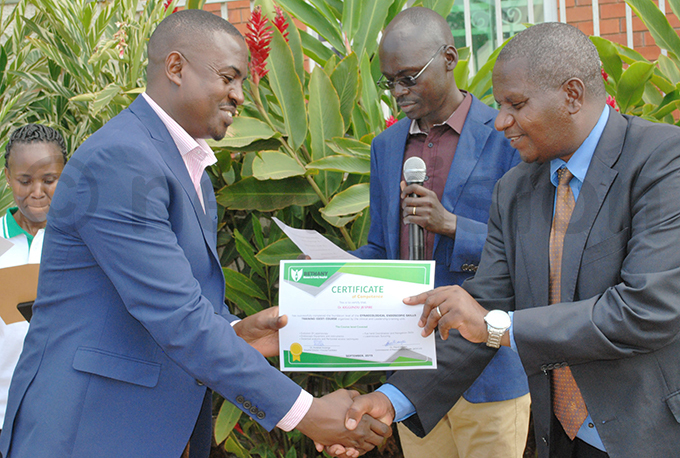Gynaecologists equipped with keyhole surgery skills
Keyhole surgery is an operation performed in the abdomen or pelvis using incisions with the aid of the camera to view the details
"I have learnt to have respect for human tissue. The ways of handling them carefully, ensuring I perverse nature. I have also acquired concentration skills; this means every time I am conducting surgery I have to give it my all to ensure I do it to perfection. Then without forgetting, how to coordinate the camera system and the eye," testifies Dr Victor Afayo a gynaecologist working with Arua Regional Hospital.
Afayo is one of the nine practicing gynaecologists from both public and private hospitals across the country who last Saturday received certificates of attendance after completing the first training module in keyhole surgery or laparoscopy as medically termed.
This was during the commissioning of Bethany Women and Family Hospital in Katabi in Entebbe, a specialised facility focusing on women's health including fertility management.
Dr Gonzaga Andabati who is the executive director at Bethany Hospital describes keyhole surgery as an operation performed in the abdomen or pelvis using incisions with the aid of the camera to view the details.
Andabati says all medical procedures, for example, removing fibroids, ovarian cysts, and ectopic pregnancies can be performed using the modern surgery technology apart from the caesarean section.
The assistant commissioner sexual and reproductive health services at the health ministry, Dr Placid Mihayo, commended the hospital for initiating the training in keyhole surgery.
Currently, keyhole surgery training programs are not available in Uganda. As such, surgeons have to seek training programs abroad.
 A gynaecologist who took part in the training receiving a certificate. Photo by Agnes Kyotalengerire
A gynaecologist who took part in the training receiving a certificate. Photo by Agnes Kyotalengerire
Although some surgeons in Uganda are still conducting the traditional open surgical procedures, the state minister for health in charge of general duties, Sarah Opendi, noted that other countries such as in Italy, India and South Africa have already embraced the technology as the main method of treatment.
"We appreciate the private partners who are beginning to offer training for such important modern skills that government cannot offer at the moment," Opendi said.
Dr Lawrence Kabibwe a gynaecologist working with Kawempe-Mulago hospital who also recently completed training at Bethany Hospital said the government will save a lot of money by providing surgeons keyhole surgery training programs not to mention the benefits to patients.
"If the services are available in public facilities, it will reduce the huge patient admissions because healing is faster. The patient is discharged on the day of the operation and can return to work after four days," Kazibwe notes.
Benefits of keyhole surgery
Keyhole surgery has got numerous advantages over the traditional method also termed as open surgery where large incisions are made to get to the abdomen.
Andabati a laparoscopy specialist at Bethany Hospital explains that bleeding tendencies are minimal in keyhole surgery. Consequently, there are reduced chances of blood transfusion.
Additionally, incision is smaller (to the size of keyhole) which reduces pain and shortens recovery time as well as resulting in less scarring, Andabati explains and adds; the patient will have a shorter hospital stay; patients often get discharged on the same day which implies that they can resume work sooner compared to patients who had open surgery.
He notes that there is a reduced risk of acquiring infections due to limited exposure of internal organs to possible external contaminants.